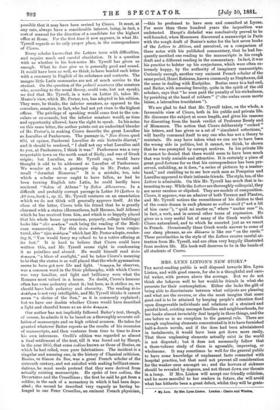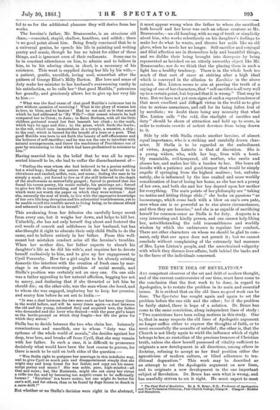MRS. LYNN LINTON'S NEW STORY.*
THE novel-reading public is well disposed towards Mrs. Lynn Linton, and with good reason, for she is a thoughtful and care. ful writer, with powers above the average. But we do not think she behaves well to her would-be friends in what she presents for their contemplation. Either she lacks the gift of being able to discriminate between what subjects are pleasing and what are the reverse, or else she must imagine that some good end is to be attained by keeping people's attention fixed upon disagreeable individuals and relations of a strained and painful kind, existing amongst families and neighbourhoods, for her books almost invariably deal largely in these things, and the one before us is no exception to the general rule. There are enough unpleasing elements concentrated in it to have furnished half-a-dozen novels, and if the dose had been administered in instalments, it would have been got down more easily. That these unpleasing elements actually exist in the world is not disputed ; but it does not necessarily follow that a three-volume study of them is agreeable, improving, or wholesome. It may sometimes be well for the general public to have some knowledge of unpleasant facts connected with hospital practice, but that need not prevent all consideration for the weaker ones amongst us ; and the horrors of sickness should be revealed by degrees, and not thrust down our throats in a lump. If Mrs. Linton will accept our friendly criticism, and be more merciful to her readers in future, she will avoid what has hitherto been a great defect, whilst they will be grate.
'My Lore. By Mrs. Lynn Linton. London Matto and Windup.
ful to us for the additiohal pleasure they will derive from her works.
The heroine's father, Mr. Branscombe, is an atrocious old sham,—conceited, stupid, shallow, heartless, and selfish ; there is no good point about him. Being firmly convinced that he is a universal genius, he spends his life in painting and writing poetry and music, though he has no talent for either of these things, and is ignorant even of their rudiments. Some one to be in constant attendance on him, to admire and to believe in him, to be his adoring slave, in short, is a necessary of his existence. This want is supplied during her life by his wife,— a patient, gentle, unselfish, loving soul, somewhat after the pattern of George Eliot's Maly Barton. Her love and sense of duty make her minister to her husband's overweening vanity to his satisfaction, so he calls her " that good Matilda," patronises her grandly, and graciously allows her to give up her very life to him :—
" What was the final cause of that good Matilda's existence but to give without question of receiving ? What is the glory of woman but to love, to bless, and to bestow ? Had he not said so in that sonnet which he had addressed to 'My Wife P'—that sonnet wherein he had compared her to Ceres ; to Juno; to Saint Barbara, with all the little children gathered round her feet beneath her cloak ; to the moth, which lays its eggs and dies ; to the grass, which feeds the lambs ; to the oak, which man immortalises in a temple, a mansion, a ship ; to the coal, which is burned for the benefit of a hero or a poet. That good Matilda was born to set forth the beauty of self-effacement and the holiness of self-sacrifice; and he was not the one to interfere with natural arrangements, and throw the machinery of Providence out of gear by ministering to that which had been predestined to minister to him."
Having married him in the belief that he was all he repre- sented himself to be, she had to suffer the disenchantment of-
" Finding the man whom she had believed to be a genius nothing but a wind-bag ; finding the nature which she had believed to be chivalrous and exalted, selfish, vain, and mean ; finding the man to be simply a mask ; yet forced to live as if she still believed in the depth of the shallowness so sorrowfully ganged ; forced to pretend that she found his verses poetry, his music melody, his paintings art ; forced to give her life in transcribing, and her strength in praising things which were not worth the paper on which they were written ! And she, naturally the soul of truth, to live with the oppressive knowledge of her own life-long deception and his substantial worthlessness, yet to be unable to tell the terrible secret to living being, to be almost afraid and ashamed to confess it to herself."
This awakening from her delusion she carefully keeps secret from every one, but it weighs her down, and helps to kill her. Unluckily, she has not only herself dug about and fostered the evil weeds of conceit and selfishness in her husband, but has also thought it right to educate their only child Stella to do the same, and to believe entirely in her father. From this well- meant but mistaken conduct arise all the heroine's troubles. When her mother dies, her father expects to absorb his daughter's life as he did his wife's, and requires her to devote herself exclusively to him, and to give up her engagement to Cyril Ponsonby. How far a girl ought to let already existing domestic ties interfere with the creation of fresh ones by mar- riage is an often-recurring problem of social morals, and Stella's position was certainly not an easy one. On one side was a father appealing to her natural affection, begging her not to marry, and declaring that if she thwarted or left him he
should die; on the other side, was the man whom she loved, and to whom she was engaged, imploring her to keep her promise, and marry him before he set out to India :— " It was a duel between the two men such as has been many times in the world before, and will be many times again—a duel between the old and the young, inherited duty and acquired love, the father who demanded and the lover who desired—with the poor girl's heart as the battle-ground on which they fought—her life the prize for which they strove."
Stella has to decide between the two who claim her Intensely conscientious and unselfish, one to whom "duty was the epitome of the whole world of morals," she decides against her deep, true love, and breaks off from Cyril, that she may remain with her father. In such a case, it is difficult to pronounce decisively what would have been the best course to pursue, for there is much to be said on both sides of the question :—
"Was Stella right to postpone her marriage in this indefinite way, and to give Cyril so much pain and disappointment simply that she might stay and keep house for her father, and copy out his manu- script poetry and music ? She was noble, pare, high-minded—all that and more ; but, like Hortensia, might she not carry her virtue a trifle too far, and by becoming too angelic cease to be sufficiently human ? 'Excelsior' is a brave motto; but one might do better for one's self, and for others, than to be found by dogs frozen to death in a snow-drift !"
But whether or no Stelles decision were right in the abstract,
it must appear wrong when the father to whom she sacrificed. both herself and her lover was such an odious creature as Mr. Branscombe,—an old humbug, with no rag of truth or simplicity about him, who works relentlessly on his daughter's feelings to make her do what he wants, and throws her aside like an old glove, when he needs her no longer. Self-sacrifice and conjugal and filial affection are in themselves holy and beautiful things,. and we dislike their being brought into disrepute by being represented as lavished on an utterly unworthy object like Mr. Branscombe; nor do we think that the placing them in such a light has a healthy tendency. There is in the whole book too, much of that sort of sneer at striving after a high ideal which is conveyed in the allusion to Excelsior in the above extract. Mrs. Linton seems to aim at proving the truth of a saying of one of her characters, that "self-sacrifice is all very well up to a certain point, but beyond that it is wrong." That may be true. But we have not yet seen signs of such a superabundance of that most excellent and difficiult virtue in the world as to give rise to serious uneasiness, and call for its being fallen foul of by novelists ; we doubt there being any necessity that what Mrs. Linton calls "the cold, dim starlight of sacrifice and duty" should be shorn of attraction and held up to scorn, in order to restrain crowds of ardent devotees from being drawn to it.
Side by side with Stella stands another heroine, of almost equal importance, who is a striking and carefully drawn char- acter. If Stella is to be regarded as the embodiment of virtue, Augusta Latrobe is that of discretion. She is. a young widow, who, with her boy, lives with a horri- bly unamiable, evil-tempered, old mother, who snubs and abuses her, and makes her life a burden to her. She bears all insults with a patience and good-temper that would be simply angelic if springing from the highest motives ; but, unfortu- nately, she is influenced by the less exalted and more worldly consideration of fear of losing her home, as she has not a penny of her own, and both she and her boy depend upon her mother for everything. The main points of her philosophy are "taking no notice and letting things slide ;" she looks on passions "as boomerangs, which come back with a blow on one's own pate,. save when one is so powerful as to rise above circumstances, and then they are luxuries," and she is as capable of sacrificing herself for common-sense as Stella is for duty. Augusta is a very interesting and kindly person, and one.cannot help liking her, notwithstanding the cold reasonableness and worldly wisdom by which she endeavours to regulate her conduct. There are other characters on whom we should be glad to com- ment, only that our space does not permit it ; but we cannot conclude without complaining of the extremely bad manners of Mrs. Lynn Linton's people, and the unrestrained vulgarity with which they discuss love-affairs, both behind the backs and to the faces of the individuals concerned.



































 Previous page
Previous page